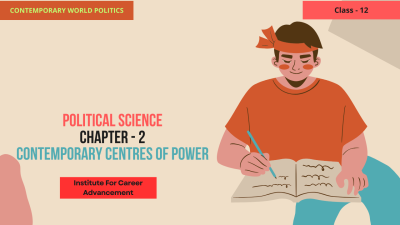
Contemporary Centres of Power - Class 12
Contemporary Centers of Power refers to the states, regions, and organizations that exert significant influence on the global stage. These centers of power can be political, economic, or cultural. Key contemporary centers of power: United States: The United States remains the world's leading superpower, with significant military, economic, and cultural influence. China: China has emerged as a major economic and political power, with a growing global footprint. European Union (EU): The EU is a regional economic and political union that has become a significant player on the global stage. Russia: Russia, despite economic challenges, remains a major military power and a key player in regional and global affairs. India: India is a rising economic and political power with a large population and a growing influence on the global stage. Other emerging powers: Other emerging powers, such as Brazil, South Africa, and Turkey, are also gaining influence on the global stage. International organizations: International organizations, such as the United Nations, the World Bank, and the International Monetary Fund, play a significant role in shaping global governance. Factors that contribute to the power of these centers: Economic strength: A strong economy is a key factor in determining a country's power. Military power: A powerful military can be used to exert influence and protect national interests. Cultural influence: A country's culture, including its language, values, and traditions, can also be a source of power. Political leadership: Effective political leadership can enhance a country's power and influence. Diplomatic skills: A country's ability to negotiate and build relationships with other countries is also important. The distribution of power in the world is constantly evolving, and new centers of power may emerge in the future. Understanding the dynamics of contemporary centers of power is essential for understanding the complexities of the global political landscape. সমসাময়িক ক্ষমতার কেন্দ্রগুলি রাজ্য, অঞ্চল এবং সংস্থাগুলিকে বোঝায় যা বিশ্ব মঞ্চে উল্লেখযোগ্য প্রভাব ফেলে। ক্ষমতার এই কেন্দ্রগুলি রাজনৈতিক, অর্থনৈতিক বা সাংস্কৃতিক হতে পারে। সমসাময়িক ক্ষমতার প্রধান কেন্দ্রগুলিঃ মার্কিন যুক্তরাষ্ট্রঃ উল্লেখযোগ্য সামরিক, অর্থনৈতিক এবং সাংস্কৃতিক প্রভাব সহ মার্কিন যুক্তরাষ্ট্র বিশ্বের শীর্ষস্থানীয় পরাশক্তি হিসাবে রয়ে গেছে। চীনঃ ক্রমবর্ধমান বৈশ্বিক পদচিহ্ন সহ চীন একটি প্রধান অর্থনৈতিক ও রাজনৈতিক শক্তি হিসাবে আবির্ভূত হয়েছে। ইউরোপীয় ইউনিয়ন (ইইউ) ইইউ একটি আঞ্চলিক অর্থনৈতিক ও রাজনৈতিক ইউনিয়ন যা বিশ্ব মঞ্চে একটি উল্লেখযোগ্য খেলোয়াড় হয়ে উঠেছে। রাশিয়াঃ অর্থনৈতিক চ্যালেঞ্জ সত্ত্বেও রাশিয়া একটি প্রধান সামরিক শক্তি এবং আঞ্চলিক ও বৈশ্বিক বিষয়ে একটি মূল খেলোয়াড় হিসাবে রয়ে গেছে। ভারতঃ বিশাল জনসংখ্যা এবং বিশ্ব মঞ্চে ক্রমবর্ধমান প্রভাব সহ ভারত একটি উদীয়মান অর্থনৈতিক ও রাজনৈতিক শক্তি। অন্যান্য উদীয়মান শক্তিঃ ব্রাজিল, দক্ষিণ আফ্রিকা এবং তুরস্কের মতো অন্যান্য উদীয়মান শক্তিও বিশ্ব মঞ্চে প্রভাব বিস্তার করছে। আন্তর্জাতিক সংস্থাঃ জাতিসংঘ, বিশ্বব্যাংক এবং আন্তর্জাতিক মুদ্রা তহবিলের মতো আন্তর্জাতিক সংস্থাগুলি বিশ্ব শাসন গঠনে গুরুত্বপূর্ণ ভূমিকা পালন করে। এই কেন্দ্রগুলির ক্ষমতায় অবদান রাখার কারণগুলিঃ অর্থনৈতিক শক্তিঃ একটি শক্তিশালী অর্থনীতি একটি দেশের শক্তি নির্ধারণের মূল বিষয়। সামরিক শক্তিঃ একটি শক্তিশালী সেনাবাহিনীকে প্রভাব বিস্তার এবং জাতীয় স্বার্থ রক্ষার জন্য ব্যবহার করা যেতে পারে। সাংস্কৃতিক প্রভাবঃ ভাষা, মূল্যবোধ এবং ঐতিহ্য সহ একটি দেশের সংস্কৃতিও শক্তির উৎস হতে পারে। রাজনৈতিক নেতৃত্বঃ কার্যকর রাজনৈতিক নেতৃত্ব একটি দেশের ক্ষমতা ও প্রভাব বাড়িয়ে তুলতে পারে। কূটনৈতিক দক্ষতাঃ একটি দেশের অন্যান্য দেশের সঙ্গে আলোচনা ও সম্পর্ক গড়ে তোলার ক্ষমতাও গুরুত্বপূর্ণ। বিশ্বে ক্ষমতার বন্টন ক্রমাগত বিকশিত হচ্ছে এবং ভবিষ্যতে ক্ষমতার নতুন কেন্দ্রগুলি আবির্ভূত হতে পারে। বৈশ্বিক রাজনৈতিক দৃশ্যপটের জটিলতা বোঝার জন্য সমসাময়িক ক্ষমতার কেন্দ্রগুলির গতিশীলতা বোঝা অপরিহার্য।

 0
0